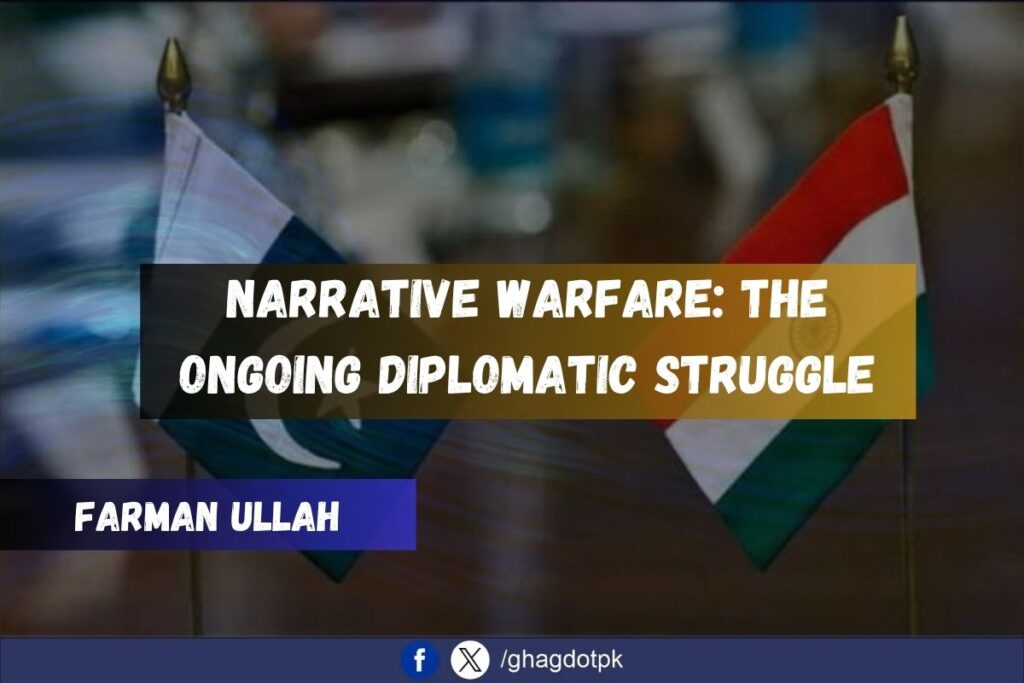By Farman Ullah
The diplomatic battle between Pakistan and India has intensified, with both countries engaging in a war of narratives. After facing off on the battlefield, Pakistan and India are now fighting a battle of narratives, with each side sending high-level delegations to world capitals to communicate their respective points of view regarding the recent hostilities. This battle of narratives is crucial in shaping the international community’s perception of the conflict and garnering support for each side’s stance.
Prime Minister Shehbaz Sharif’s Crucial Diplomatic Tour
Prime Minister Shehbaz Sharif has embarked on a four-nation tour, visiting Turkiye, Iran, Azerbaijan, and Tajikistan. This tour aims to garner support for Pakistan’s stance on the recent conflict and demonstrate Pakistan’s commitment to diplomatic efforts. By engaging with key regional states, Pakistan is seeking to build a coalition of support and create a united front against India’s aggression. The tour also provides an opportunity for Prime Minister Sharif to personally interact with leaders of these countries and convey Pakistan’s concerns about the conflict.
Meanwhile, current and former lawmakers and diplomats are scheduled to visit the US and Europe to meet with influential individuals and organizations. These visits will help to build support for Pakistan’s stance and provide an opportunity for Pakistan to present its narrative to the international community.
India’s Aggressive Lobbying Efforts
India has also dispatched a team, led by lawmaker and former UN official Shashi Tharoor, to the US to lobby for their perspective. The Indian team has been engaging with think tanks, media, and lawmakers to present their narrative and build support for India’s stance. India’s lobbying efforts are aimed at convincing the international community that Pakistan is responsible for the recent hostilities and that India’s actions are justified.
However, India’s aggressive lobbying efforts have been met with skepticism by many in the international community. India’s lack of evidence to support its claims against Pakistan has raised questions about the credibility of its narrative. Furthermore, India’s actions in the region, including its threats to the Indus Waters Treaty, have raised concerns about its commitment to peace and stability.
Pakistan’s Strong Diplomatic Leverage
Pakistan has strong arguments to present to the international community. The fact is that India started blaming Pakistan for the Pahalgam atrocity without any evidence. India has yet to share details of any alleged Pakistani role with Pakistan or the international community. Pakistan’s diplomatic efforts are focused on highlighting India’s lack of evidence and emphasizing the need for a thorough investigation into the incident.
Pakistan’s diplomatic leverage is also based on its commitment to peace and stability in the region. Pakistan has consistently called for a peaceful resolution to the conflict and has offered to engage in dialogue with India to address its concerns. Pakistan’s willingness to negotiate and find a peaceful solution to the conflict demonstrates its commitment to regional stability and prosperity.
The Consequences of India’s Aggressive Actions
India initiated hostilities with Operation Sindoor, and Pakistan’s response was defensive. India’s actions in a nuclear neighborhood reflect a highly irresponsible attitude and raise concerns about the safety and security of the region. Furthermore, India’s threats regarding the Indus Waters Treaty violate a bilateral agreement that cannot be altered unilaterally.
The consequences of India’s aggressive actions are far-reaching and have serious implications for regional stability. India’s actions have raised tensions in the region and created a sense of uncertainty and insecurity. Pakistan’s defensive response was necessary to protect its sovereignty and territorial integrity, but it also highlights the need for a peaceful resolution to the conflict.
The Critical Importance of Diplomacy in Resolving the Conflict
While Pakistan must defend itself diplomatically, ultimately, for there to be peace in the subcontinent, both states must sit down and talk about their differences. India may not favor negotiations currently, but in the long run, a structured peace process is necessary to avoid further hostility. Diplomacy is critical in resolving the conflict and creating a sense of trust and understanding between the two countries.
Pakistan’s diplomatic efforts are focused on creating a conducive environment for negotiations and building trust between the two countries. By engaging in meaningful dialogue and addressing their differences, Pakistan and India can work towards a peaceful resolution to the conflict and ensure stability in the region.
The International Community’s Role in Promoting Peace and Stability
The international community is unlikely to sit back and watch if tensions escalate to the point of a nuclear exchange. Foreign powers may need to intervene to prevent a catastrophic conflict. New Delhi’s reaction to Donald Trump’s claims of mediating the ceasefire highlights India’s reluctance to involve foreign powers in its disputes with Pakistan.
The international community has a critical role to play in promoting peace and stability in the region. By engaging with Pakistan and India, foreign powers can help facilitate a peaceful resolution and prevent further escalation. The international community’s involvement can also help to create a sense of urgency and pressure both countries to engage in meaningful dialogue.






